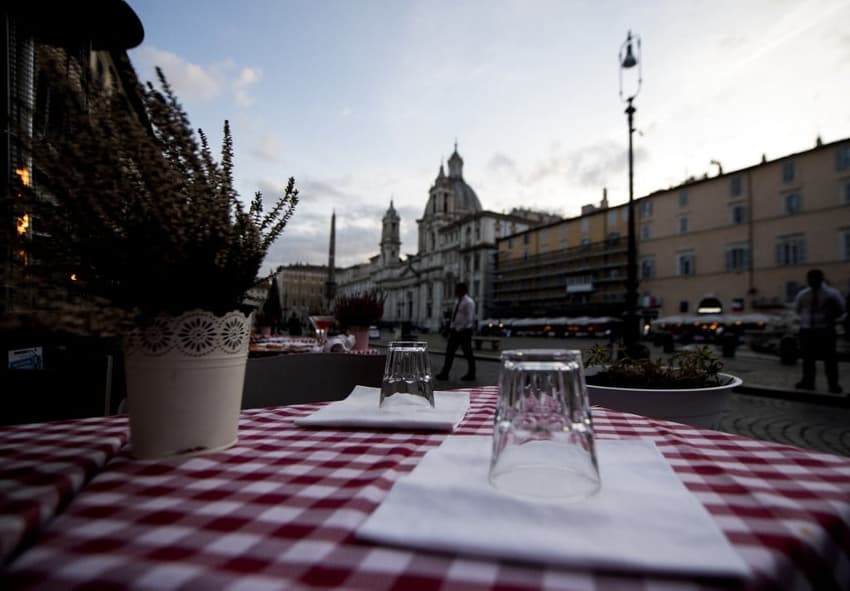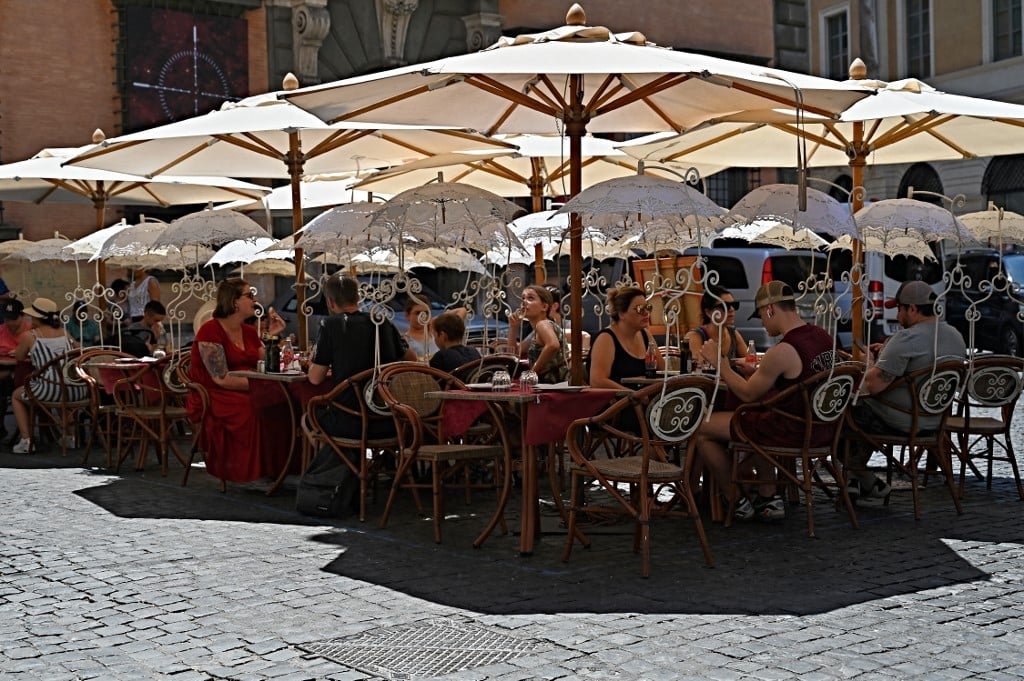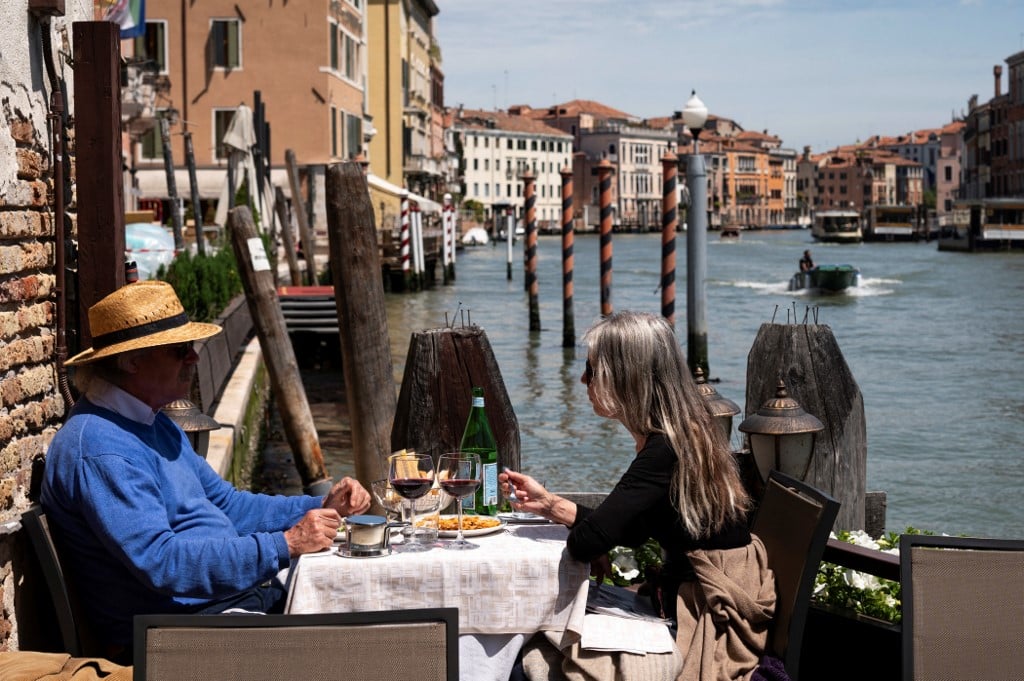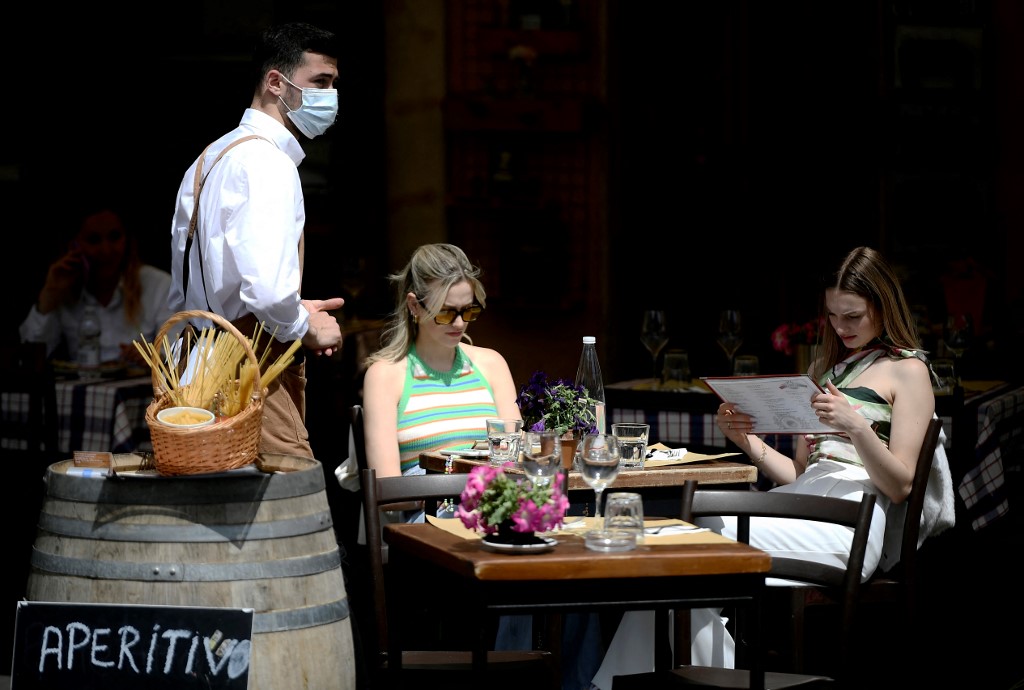EXPLAINED: What to do if you’re overcharged at a restaurant in Italy

With increased reports of Italian restaurants overcharging customers this year, what are your rights and what can you do if this happens to you?
This summer, Italian media has featured numerous reports of inflated prices and additional charges added to bills by restaurants and other businesses, and consumer protection groups say that the problem is becoming more widespread.
Summer holidays in Italy were expected to be much more expensive all round this year amid soaring inflation. Even so, customers felt some prices were unjustified: in just two recent examples, an Italian couple paid 30 euros for two coffees and a bottle of water in the Sardinian resort of Porto Cervo, while holidaymakers in Capitolo, Puglia, paid 26 euros for a puccia (a type of sandwich).
While overpriced food and drink in Italy's tourist hotspots is nothing new, there has also been a spate of reports of small but unexpected charges being added to restaurant bills.
Italy’s Il Corriere della Sera newspaper this month reported how diners at one restaurant on Lake Como found a two-euro charge on their bill which turned out to be for cutting a toasted sandwich in half.
One family in Liguria were charged two euros for an extra plate, and a diner in Naples was charged one euro to have basil added to a pizza.
According to Italian consumer rights experts, there has been a rising number of reports of restaurants adding on such charges recently, and it's not always clear to customers whether or not this is legal.

(Photo by Andreas SOLARO / AFP)
“This year complaints from consumers have increased, because trickery by businesses has increased,” explains Massimiliano Dona, a lawyer and president of Italy's national consumers' union (Unione nazionale consumatori), speaking in an interview with Corriere.
“All of this is, in my opinion, due to a generally difficult [economic] situation,” he says.
“Unfortunately, I see a climate of war between the restaurateurs on one side, who are at the end of a supply chain full of price increases, and the customers on the other, who have less money in their pockets because of fixed salaries and inflation, and who are therefore more attentive and vigilant,” he adds.
Common problems
Not issuing a receipt, refusing card payments, and not accurately displaying prices are some of the most common things bars and restaurants get into trouble for in Italy.
Under Italian law, a restaurant, bar or cafe has to accurately list the prices of all goods and services on a menu or price list which is visible to the customer before they order.
READ ALSO: How to spot the Italian restaurants to avoid
As for restaurants found to have ‘dual menus’ featuring differing prices for Italians and foreigners, “making any difference between customers is very serious,” and can be reported to police, says Dona.
In any case, where two different prices are displayed for the same thing, the customer has a right to pay the lower price.
But what about charges for supposed extras - such as for basil on a pizza, or for cutting a sandwich in half?
“From a legal point of view, if these supplements are indicated on the menu, they are legitimate,” Dona explains. “The important thing is that the customer is informed. If not, the customer can refuse to pay for those items.”
READ ALSO: What are the rules on tipping in Italy?
However, he says: “In the case of the two euros to cut toast in half on Lake Como, we are at the limit. This also applies to basil: it is usually included on the pizza.”
“If you start charging separately for what is normally included in the dish, you take the route of some low cost airlines, which have effectively broken down the service - and they are now hated.”
A line is crossed when it comes to extra charges for things like spoons and plates, however.
“Crockery, plates and napkins should be included in the cover charge,” says Dona. “My advice is to always check the receipt. If such items are found, you can refuse to pay for them.”

Tourists enjoy a meal at a restaurant by the Grand Canal in Venice. Photo by Marco Bertorello / AFP
When it’s not a scam
Some charges added to the bill as standard in Italian restaurants come as a surprise to first-time visitors - but they're not always an attempt to overcharge you.
Many restaurants in Italy, as in some other countries, automatically add a cover charge. You’ll see this listed on your bill as a coperto, or perhaps as servizio (service) or pane (bread). The charge is normally €2 to €4 per person, and many people don't mind paying what is essentially a service charge, particularly given that there's no expectation of tipping in Italy.
But this charge can become controversial if it’s especially high. Fine-dining restaurants or those in prime locations usually charge much more: a coperto of €10 or even €15 per person would not be unheard of at a restaurant in Venice’s Piazza San Marco or by Milan’s Duomo, for example.
READ ALSO: 'A rip-off': Should you really get mad about Italy’s cover charge?
Whether or not such high prices are fair is debatable, but under Italian law restaurants can legally charge what they like for this as long as the coperto is listed on the menu.
You may also find that waiters bring bottled water to your table automatically, and then charge you for it. This might be surprising to visitors, but it's an assumption based on the fact that their Italian customers have water with every meal and generally expect bottled, or at least filtered, water, not tap water (which is safe to drink, but may not taste that great.)
So this is unlikely to be an attempt to rip you off - unless, of course, the price on your bill turns out to be higher than that on the menu. In any case, you have the right to ask for (free) tap water if you want it.

(Photo by Filippo MONTEFORTE / AFP)
And one case where people often feel they’ve been overcharged is when ordering fresh fish or daily specials which aren’t on the menu.
Always check the price with the waiter and, for the catch of the day, remember any price given is usually by weight - and you’ll want to go to the seafood counter (any decent seafood restaurant in Italy will have their fresh fish on display) to select what you want yourself.
What can you do about overcharging?
If you think you’ve been incorrectly charged, the first step is obviously to query your bill. After all, mistakes happen, and the business may simply remove it.
Dona warns against posting negative reviews of businesses online later without querying the bill at the time, as reportedly happened in some of the cases reported in Italian media this summer.
READ ALSO: Aperol and aperitivo: A guide to visiting bars and cafes in Italy
If however the business owner refuses to remove a charge (which you’re absolutely sure is illegitimate) you could inform them that you’ll be leaving a review. Italian businesses in general are extremely concerned about how online reviews affect their image, and this may be enough to have them reconsider.
If all else fails, you may be left with no choice but to invoke the Guardia di Finanza, Italy’s financial police unit. Let the restaurant owner know you’ll be making a denuncia and you might just find the incorrect charge is removed.
You can call the Guardia di Finanza on 117.
Paying by card
On a related note, it's no secret that some Italian businesses seem averse to card payments. But it’s important to know that you have the right to pay by debit or credit card, regardless of the amount. By law, businesses cannot refuse card payments (and, in case you're wondering, this rule also applies to taxi drivers.)
“If this happens, the customer can call the Guardia di Finanza (financial police) or the local police: there is a fine of 30 euros plus 4 percent of the denied transaction,” explains Dona.
“Of course, if it happens in a place where the card reader usually works and that day there is a breakdown, the customer can understand the situation, but sometimes you find ‘out of order’ signs with yellowed tape. That is a very serious violation,” he adds.
It’s also illegal to request a minimum amount for card payment, Dona confirms, while adding a surcharge for electronic payment, as in one recently reported case, is “an unfair commercial practice,” which can also be reported to the financial police.
In any of these situations, if all else fails, you may find that a mention of the Guardia di Finanza tends to miraculously jolt any malfunctioning card machines (or their owners) into action.
Have you experienced overcharging, refusal of card payments or similar problems at a restaurant or other business in Italy? Leave a comment below or get in touch by email to share your experience.
Comments (1)
See Also
This summer, Italian media has featured numerous reports of inflated prices and additional charges added to bills by restaurants and other businesses, and consumer protection groups say that the problem is becoming more widespread.
Summer holidays in Italy were expected to be much more expensive all round this year amid soaring inflation. Even so, customers felt some prices were unjustified: in just two recent examples, an Italian couple paid 30 euros for two coffees and a bottle of water in the Sardinian resort of Porto Cervo, while holidaymakers in Capitolo, Puglia, paid 26 euros for a puccia (a type of sandwich).
While overpriced food and drink in Italy's tourist hotspots is nothing new, there has also been a spate of reports of small but unexpected charges being added to restaurant bills.
Italy’s Il Corriere della Sera newspaper this month reported how diners at one restaurant on Lake Como found a two-euro charge on their bill which turned out to be for cutting a toasted sandwich in half.
One family in Liguria were charged two euros for an extra plate, and a diner in Naples was charged one euro to have basil added to a pizza.
According to Italian consumer rights experts, there has been a rising number of reports of restaurants adding on such charges recently, and it's not always clear to customers whether or not this is legal.

“This year complaints from consumers have increased, because trickery by businesses has increased,” explains Massimiliano Dona, a lawyer and president of Italy's national consumers' union (Unione nazionale consumatori), speaking in an interview with Corriere.
“All of this is, in my opinion, due to a generally difficult [economic] situation,” he says.
“Unfortunately, I see a climate of war between the restaurateurs on one side, who are at the end of a supply chain full of price increases, and the customers on the other, who have less money in their pockets because of fixed salaries and inflation, and who are therefore more attentive and vigilant,” he adds.
Common problems
Not issuing a receipt, refusing card payments, and not accurately displaying prices are some of the most common things bars and restaurants get into trouble for in Italy.
Under Italian law, a restaurant, bar or cafe has to accurately list the prices of all goods and services on a menu or price list which is visible to the customer before they order.
READ ALSO: How to spot the Italian restaurants to avoid
As for restaurants found to have ‘dual menus’ featuring differing prices for Italians and foreigners, “making any difference between customers is very serious,” and can be reported to police, says Dona.
In any case, where two different prices are displayed for the same thing, the customer has a right to pay the lower price.
But what about charges for supposed extras - such as for basil on a pizza, or for cutting a sandwich in half?
“From a legal point of view, if these supplements are indicated on the menu, they are legitimate,” Dona explains. “The important thing is that the customer is informed. If not, the customer can refuse to pay for those items.”
READ ALSO: What are the rules on tipping in Italy?
However, he says: “In the case of the two euros to cut toast in half on Lake Como, we are at the limit. This also applies to basil: it is usually included on the pizza.”
“If you start charging separately for what is normally included in the dish, you take the route of some low cost airlines, which have effectively broken down the service - and they are now hated.”
A line is crossed when it comes to extra charges for things like spoons and plates, however.
“Crockery, plates and napkins should be included in the cover charge,” says Dona. “My advice is to always check the receipt. If such items are found, you can refuse to pay for them.”

When it’s not a scam
Some charges added to the bill as standard in Italian restaurants come as a surprise to first-time visitors - but they're not always an attempt to overcharge you.
Many restaurants in Italy, as in some other countries, automatically add a cover charge. You’ll see this listed on your bill as a coperto, or perhaps as servizio (service) or pane (bread). The charge is normally €2 to €4 per person, and many people don't mind paying what is essentially a service charge, particularly given that there's no expectation of tipping in Italy.
But this charge can become controversial if it’s especially high. Fine-dining restaurants or those in prime locations usually charge much more: a coperto of €10 or even €15 per person would not be unheard of at a restaurant in Venice’s Piazza San Marco or by Milan’s Duomo, for example.
READ ALSO: 'A rip-off': Should you really get mad about Italy’s cover charge?
Whether or not such high prices are fair is debatable, but under Italian law restaurants can legally charge what they like for this as long as the coperto is listed on the menu.
You may also find that waiters bring bottled water to your table automatically, and then charge you for it. This might be surprising to visitors, but it's an assumption based on the fact that their Italian customers have water with every meal and generally expect bottled, or at least filtered, water, not tap water (which is safe to drink, but may not taste that great.)
So this is unlikely to be an attempt to rip you off - unless, of course, the price on your bill turns out to be higher than that on the menu. In any case, you have the right to ask for (free) tap water if you want it.

And one case where people often feel they’ve been overcharged is when ordering fresh fish or daily specials which aren’t on the menu.
Always check the price with the waiter and, for the catch of the day, remember any price given is usually by weight - and you’ll want to go to the seafood counter (any decent seafood restaurant in Italy will have their fresh fish on display) to select what you want yourself.
What can you do about overcharging?
If you think you’ve been incorrectly charged, the first step is obviously to query your bill. After all, mistakes happen, and the business may simply remove it.
Dona warns against posting negative reviews of businesses online later without querying the bill at the time, as reportedly happened in some of the cases reported in Italian media this summer.
READ ALSO: Aperol and aperitivo: A guide to visiting bars and cafes in Italy
If however the business owner refuses to remove a charge (which you’re absolutely sure is illegitimate) you could inform them that you’ll be leaving a review. Italian businesses in general are extremely concerned about how online reviews affect their image, and this may be enough to have them reconsider.
If all else fails, you may be left with no choice but to invoke the Guardia di Finanza, Italy’s financial police unit. Let the restaurant owner know you’ll be making a denuncia and you might just find the incorrect charge is removed.
You can call the Guardia di Finanza on 117.
Paying by card
On a related note, it's no secret that some Italian businesses seem averse to card payments. But it’s important to know that you have the right to pay by debit or credit card, regardless of the amount. By law, businesses cannot refuse card payments (and, in case you're wondering, this rule also applies to taxi drivers.)
“If this happens, the customer can call the Guardia di Finanza (financial police) or the local police: there is a fine of 30 euros plus 4 percent of the denied transaction,” explains Dona.
“Of course, if it happens in a place where the card reader usually works and that day there is a breakdown, the customer can understand the situation, but sometimes you find ‘out of order’ signs with yellowed tape. That is a very serious violation,” he adds.
It’s also illegal to request a minimum amount for card payment, Dona confirms, while adding a surcharge for electronic payment, as in one recently reported case, is “an unfair commercial practice,” which can also be reported to the financial police.
In any of these situations, if all else fails, you may find that a mention of the Guardia di Finanza tends to miraculously jolt any malfunctioning card machines (or their owners) into action.
Have you experienced overcharging, refusal of card payments or similar problems at a restaurant or other business in Italy? Leave a comment below or get in touch by email to share your experience.
Join the conversation in our comments section below. Share your own views and experience and if you have a question or suggestion for our journalists then email us at [email protected].
Please keep comments civil, constructive and on topic – and make sure to read our terms of use before getting involved.
Please log in here to leave a comment.